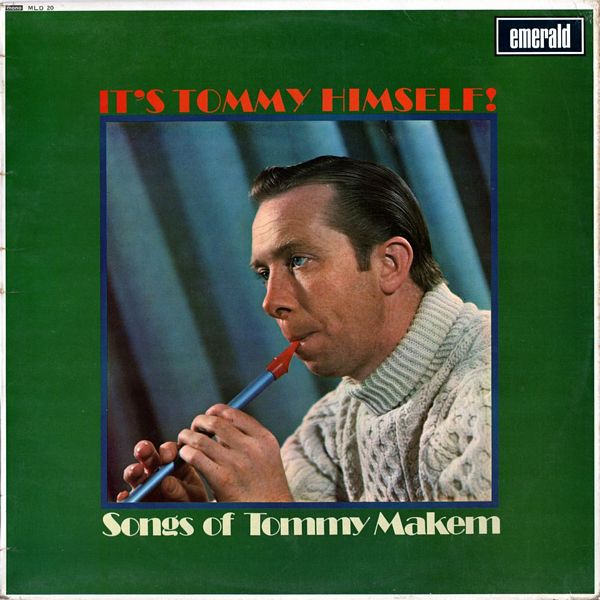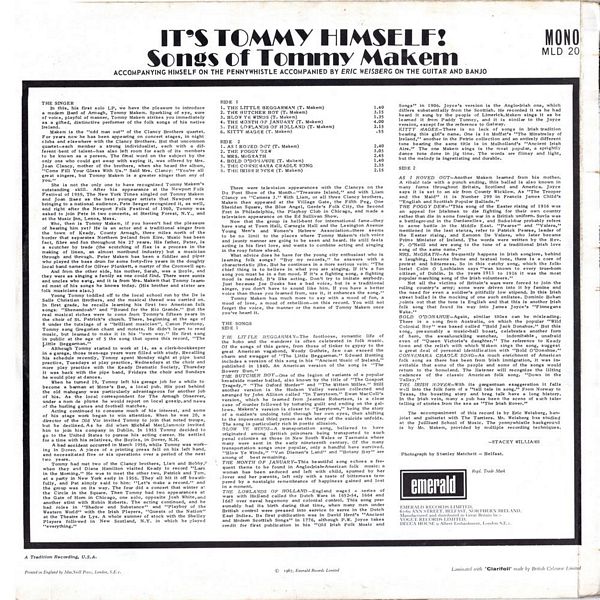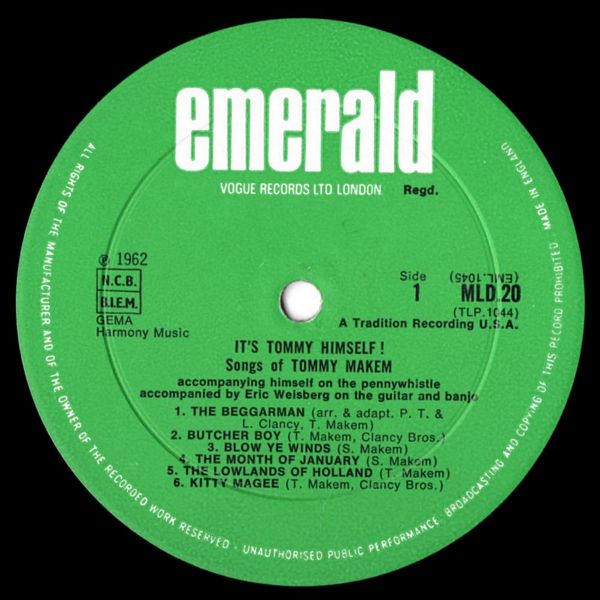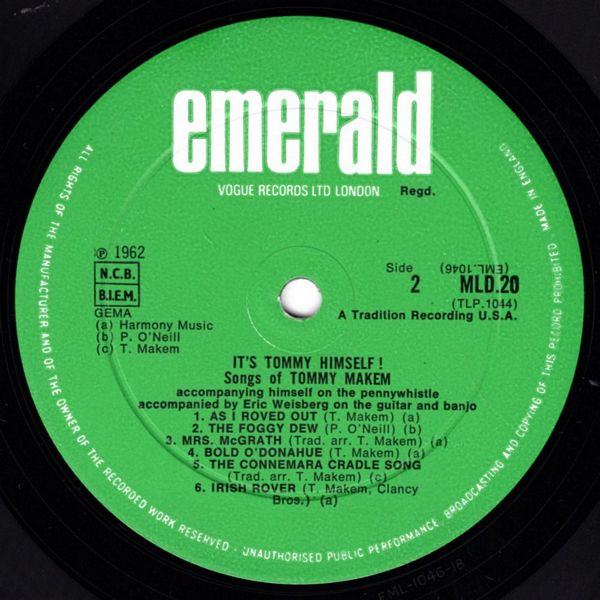

 |


 |
Sleeve Notes
THE SINGER
In this, his first solo LP, we have the pleasure to introduce a modern Bard of Armagh, Tommy Makem. Sparkling of eye, sure of voice, playful of manner, Tommy Makem strikes you immediately as a gifted, distinctive performer of the folk songs of his native Ireland.
Makem is the "odd man out" of the Clancy Brothers quartet. For two years now he has been appearing on concert stages, in night clubs and elsewhere with the Clancy Brothers. But that uncommon quartet — each member a strong individualist, each with a different bent of talent — has also left room for each of its members to be known as a person. The final word on the subject by the only one who could get away with saying it, was offered by Mrs. Joan Clancy, mother of the brothers, when she heard the Tradition album, "Come Fill Your Glass With Us." Said Mrs. Clancy: "You're all great singers, but Tommy Makem is a greater singer than any of you."
She is not the only one to have recognized Tommy Makem's outstanding skill. After his appearance at the Newport Folk Festival of 1959, The New York Times singled out Tommy Makem and Joan Baez as the best younger artists that Newport was bringing to a national audience. Pete Seeger recognized it, as well, and right after the Newport Folk Festival of 1960, Tommy was asked to join Pete in two concerts, at Sterling Forest, N.Y., and at the Music Inn, Lenox, Mass.
Who, then is Tommy Makem, if you haven't had the pleasure of hearing him yet? He is an actor and a traditional singer from the town of Keady, County Armagh, three miles north of the border that separates Northern Ireland from Eire. Music has been fact, fiber and fun throughout his 27 years. His father, Peter, is a scutcher by trade (the scutching of flax is a process in the making of linen, an almost moribund industry) but a musician through and through. Peter Makem has been a fiddler and piper who played the bass drum for some forty-five years in the doughty local band named for Oliver Plunkett, a martyr of the Cromwell age.
And from the other side, his mother, Sarah, was a Boyle, and they were as singing a family as one could find. There were aunts and uncles who sang, and it is from Mrs. Makem that Tommy learned most of his songs he knows today. (His brother and sister are folk musicians also.)
Young Tommy toddled off to the local school run by the De la Salle Christian Brothers, and the musical thread was carried on. In first grade, he recalls learning his first two American folk songs: "Shenandoah" and "Bound for the Rio Grande." But the real musical riches were to come from Tommy's fifteen years in the choir of St. Patrick's church. There, beginning at the age of 8 under the tutelage of a "brilliant musician," Canon Pentony, Tommy sang Gregorian chant and motets. He didn't learn to read music but learned to make it in his "own way." He first sang in public at the age of 5 the song that opens this record, "The Little Beggarman."
Although Tommy started to work at 14, as a clerk-bookkeeper in a garage, those teen-age years were filled with study. Recalling his schedule recently, Tommy spent Monday night at pipe band practice, Tuesdays at play practice, Wednesdays at the choir and more play practice with the Keady Dramatic Society, Thursday it was back with the pipe band, Fridays the choir and Sundays he would play at dances.
When he turned 19, Tommy left his garage job for a while to become a barman at Mone's Bar, a local pub. His post behind the old mahogany was particularly advantageous for another job of his. As the local correspondent for The Armagh Observer, under a nom de plume he would report on local gossip, and news of the hurling games and football matches.
Acting continued to consume much of his interest, and some of his stage work began to win attention. When he was 20, a director of the Old Vic invited Tommy to join that noted troupe, but he declined. As he did when Michéal MacLiammoir invited him to join his company in Dublin. In 1955 Tommy decided to come to the United States to pursue his acting career. He settled for a time with his relatives, the Boyles, in Dover, N.H.
A bad accident occurred in March 1956, while Tommy was working in Dover. A piece of a printing press fell on his left hand and necessitated five or six operations over a period of the next two years.
Tommy had met two of the Clancy brothers, Liam and Bobby, when they and Diane Hamilton visited Keady to record "Lark in the Morning." He was to meet the other two, Patrick and Tom, at a party in New York early in 1956. They all hit if off beautifully, and Pat simply said to him: "Let's make a record." and the group was on its way. The four did a concert that winter at the Circle in the Square. Then Tommy had two appearances at the Gate of Horn in Chicago, one solo opposite Josh White, and another stint with Robin Roberts. The acting continued, and he had roles in "Shadow and Substance" and "Playboy of the Western World" with the Irish Players, "Guests of the Nation" at the Theatre de Lys. A whole summer of stock with the Shelley Players followed in New Scotland, N.Y. in which he played "everything."
There were television appearances with the Clancys on the Du Pont Show of the Month — "Treasure Island," and with Liam Clancy on "Camera 3." With Liam, or all three Clancy brothers, Makem then appeared at the Village Gate, the Fifth Peg, One Sheridan Square, the Blue Angel, Gerde's Folk City, the Second Fret in Philadelphia, the Playboy Club in Chicago, and made a television appearance on the Ed Sullivan Show.
Now that the group is hell-bent for national fame — they have sung at Town Hall, Carnegie Hall and the Lexington Avenue Young Men's and Women's Hebrew Association — there seems to be no limit to the places where Tommy Makem's rich voice and jaunty manner are going to be seen and heard. He still feels acting is his first love and wants to combine acting and singing in the rosy future ahead.
What advice does he have for the young city enthusiast who is learning folk songs? "Buy my records," he answers with a characteristic jibe. But he continues in a more serious vein: "The chief thing is to believe in what you are singing. If it's a fun song you must be in a fun mood. If it's a fighting song, a fighting mood is needed. It's like acting. Don't try to imitate anybody. Just because Joe Doaks has a bad voice, but is a traditional singer, you don't have to sound like him. If you have a better voice than those you learned from, use it, it enhances the song."
Tommy Makem has much more to say with a mood of fun, a mood of love, a mood of rebellion — on this record. You will not forget the voice, the manner or the name of Tommy Makem once you've heard it.
THE SONGS
THE LITTLE BEGGARMAN — The footloose, romantic life of the hobo and the wanderer is often celebrated in folk music. Of the songs of this genre, from those of tinker to gypsy to the great American vagabond, Woody Guthrie, few can exceed the charm and swagger of "The Little Beggarman." Edward Bunting includes a version of this song in his "Ancient Music of Ireland," published in 1840. An American version of the song is "The Bowery Bum."
THE BUTCHER BOY — One of the legions of variants of a popular broadside murder ballad, also known by the title of "The Gosport Tragedy," "The Oxford Murder" and "The Wittam Miller." Still another version is the Hudson Valley version collected and arranged by John Allison called "In Tarry town." Ewan MacColl's version, which he learned from Jeannie Robertson, is a clear case of murder followed by torturing guilt and ending on the gallows. Makem's version is closer to "Tarrytown," being the story of a maiden's undoing told through her own eyes, then shifting to the impersonal third person as the story of the suicide unfolds. The song is particularly rich in poetic allusion.
BLOW YE WINDS — A transportation song, believed to have originated among British prisoners being transported to such penal colonies as those in New South Wales or Tasmania where many were sent in the early nineteenth century. Of the many transportation songs once popular, only a handful have survived. "Blow Ye Winds," "Van Dieman's Land" and "Botany Bay" are among the best remaining.
THE MONTH OF JANUARY — A dirging woman's love lament, which Makem's mother sings on "The Lark in the Morning" album (Tradition TLP 1004). This beautiful song echoes a frequent theme to be found in Anglo-Irish-American folk music: a woman has been seduced and left with child, spumed by her lover and her parents, left only with a taste of bitterness tempered by a nostalgic remembrance of happiness gained and lost in a moment.
THE LOWLANDS OF HOLLAND — England waged a series of wars with Holland called the Dutch Wars in 1652-54, 1664 and 1667 over naval hegemony and colonial control. This song presumably had its birth during that time, when many men under British control were pressed into service to serve in the Dutch East Indies. Its first publication was in David Herd's "Ancient and Modem Scottish Songs" in 1776, although P. W. Joyce takes credit for first publication in his "Old Irish Folk Music and Songs" in 1906. Joyce's version is the Anglo-Irish one, which differs substantially from the Scottish. He recorded it as he had heard it sung by the people of Limerick. Makem sings it as he learned it from Paddy Tunney, and it is similar to the Joyce version, except for the reference to Galway.
KITTY MAGEE — There is no lack of songs in Irish tradition bearing this girl's name. One is in Moffat's "The Minstrelsy of Ireland," another in the Petrie collection and an entirely different tune bearing the same title is in Mulholland's "Ancient Irish Airs." The one Makem sings is the most popular, a sprightly dance tune done in jig time. The words are flimsy and light, but the melody is ingratiating and durable.
AS I ROVED OUT — Another Makem learned from his mother. A ribald tale with a punch ending, this ballad is also known in many forms throughout Britain, Scotland and America. Joyce says it is set to an air from County Wicklow. As "The Trooper and the Maid" it is Number 299 in Francis James Child's "English and Scottish Popular Ballads."
THE FOGGY DEW — Sung by Patrick Clancy on Tradition's "The Rising of the Moon" album, who offers here this historical background: "This song of the Easter rising of 1916 was an appeal for Irishmen to die fighting for their own country rather than die in some foreign war in a British uniform. Suvla was a battleground in the Dardanelles, and Sud-el-bar probably refers to some battle in the Middle East. "Pearse" and "Valera," mentioned in the last stanza, refer to Patrick Pearse, leader of the Easter rising, and Eamonn De Valera, who later became Prime Minister of Ireland. The words were written by the Rev. P. O'Neill and are sung to the tune of a traditional Irish love song of the same name."
MRS. McGRATH — As frequently happens in Irish song lore, behind a laughing, lissome theme and textual tone, there is a core of protest and bitterness. So in this catchy song, which the folklorist Colm O Lochlainn says "was known to every true-born citizen of Dublin. In the years 1913 to 1916 it was the most popular marching song of the Irish volunteers."
Not all the victims of Britain's wars were forced to join the ruling country's army; some were driven into it by famine and the need for even a soldier's pitifully low stipend. In this Irish street ballad is the mocking of one such enlistee. Dominic Behan points out that the tune is English and that this is another Irish folk song that found its way into James Joyce's "Finnegans Wake."
BOLD O'DONAHUE — Again, similar titles can be misleading. There is a song from Australia, on which the popular "Wild Colonial Boy" was based called "Bold Jack Donahue." But this song, presumably a music-hall boast, celebrates another form of hero, the swashbuckling wencher, indomitable, unafraid even of "Queen Victoria's daughter." The reference to Keady town and the relish with which Makem sings the song, suggest a great deal of personal identification with "Bold O'Donahue."
CONNEMARA CRADLE SONG — As much enrichment of American folk song as there has been from Irish immigration, it was inevitable that some of the people and some of the songs would return to the homeland. The listener will recognize the lilting cadences of the classic American folk song, "Down in the Valley."
THE IRISH ROVER — With its gargantuan exaggeration it falls well into the folk form of a "tall tale in song." From Norway to Texas, the boasting story and brag talk have a long history. In the Irish vein, many a pub has been the scene of such tale-telling of stories from the sea as "The Irish Rover.
Tommy Makem can be heard on several other Tradition releases: — The Lark in The Morning, The Rising of the Moon, and Come Fill Your Glass With Us.
The accompaniment on this record is by Eric Weisberg, banjoist and guitarist with The Tarriers. Mr. Weisberg has studied at the Juilliard School of Music. The pennywhistle background is by Mr. Makem, provided by multiple recording techniques.
— STACEY WILLIAMS